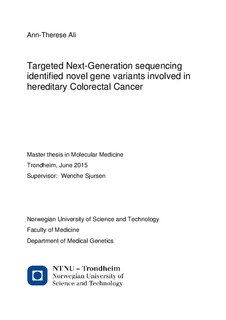Targeted Next Generation sequencing identified novel gene variants involved in hereditary colorectal cancer
Master thesis
Permanent lenke
http://hdl.handle.net/11250/2373973Utgivelsesdato
2015Metadata
Vis full innførselSamlinger
Sammendrag
cancer (CRC) is one of the most common types of cancer both worldwide and in
Norway. Risk factors and mechanisms contributing to the disease are among dietary and
lifestyle and somatic and inherited mutations. CRC is divided in three groups 1. Sporadic
CRC where the patients have no family history and no identifiable mutations; 2. Familial
CRC where the majority of genetics are unknown but the patients have at least one blood
relative, but no specific germline mutation or clear inheritance pattern; 3. Hereditary CRC
syndromes where the patients have inherited a single gene mutation in highly penetrant cancer
susceptibility genes. The genes known to date to predispose to colorectal cancer are APC,
BMPR1A, POLE, SMAD4, the MMR genes among others and these genes are related to the
hereditary CRC syndromes. There are other genes which have been found in Genome-wide
association studies (GWAS), exome studies or with next-generation sequencing (NGS) to be
associated with CRC such as KLLN, AKT1, PIK3CA, OGG1, KIF23 among others. 123
genes some known to be involved in hereditary CRC syndromes and some associated with
CRC were sequenced in 95 patients using Haloplex targeted NGS. The purpose for this master
thesis was to identify pathogenic variants in these genes that could be of help to explain the
increased CRC risk in these patients.
The results from the NGS identified 1268 unique variants which were filtered with the
downstream analysis tool FILTUS. After the variants found in only one or two patients were
selected. 64 unique variants were left to be further evaluated using the prediction software
Alamut. From the 64 variants 25 variants were selected to further investigate because those
were found to have most prominent effects on the proteins. Four out of the 25 variants were
found to be involved in predisposition to hereditary CRC syndromes; two variants identified
in POLE, a variant in BMPR1A and a variant in PTEN. The other variants identified may be
involved in CRC predisposition, but further functional studies are needed to determine their
function in CRC involvement. There were identified a few false positive variants during the
use of Haloplex targeted NGS, but because the rate of these variants were not high this
method seems to be a reliable method to use in cancer research.
